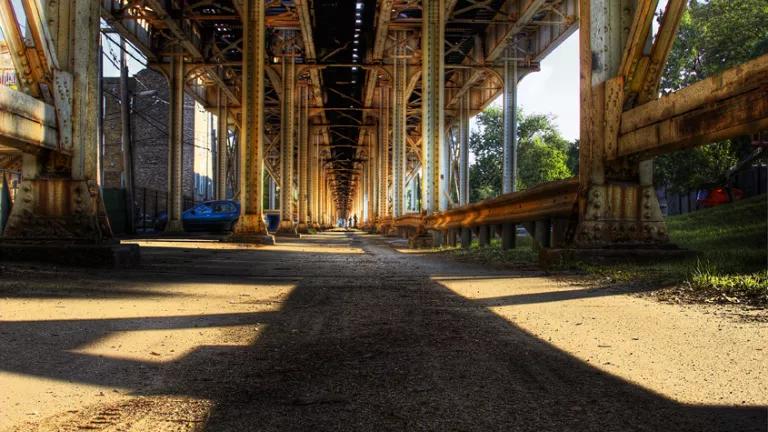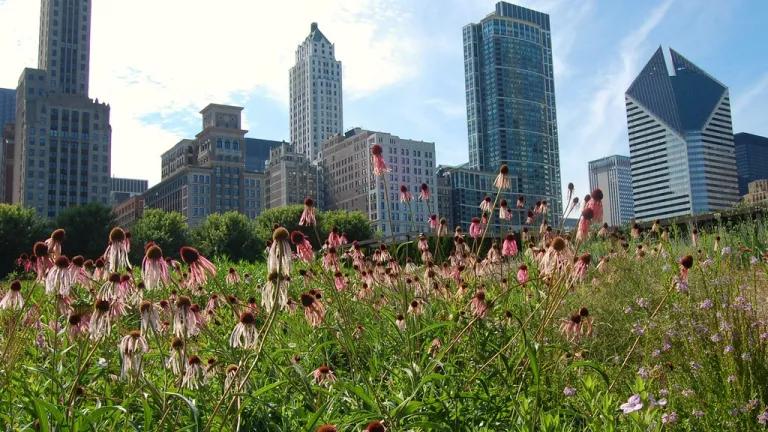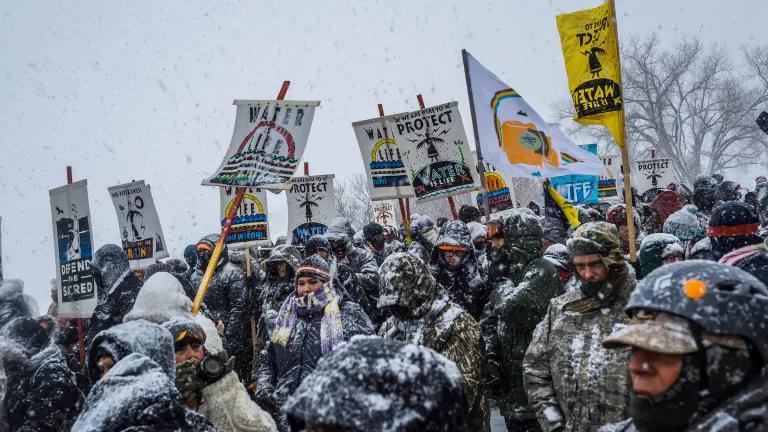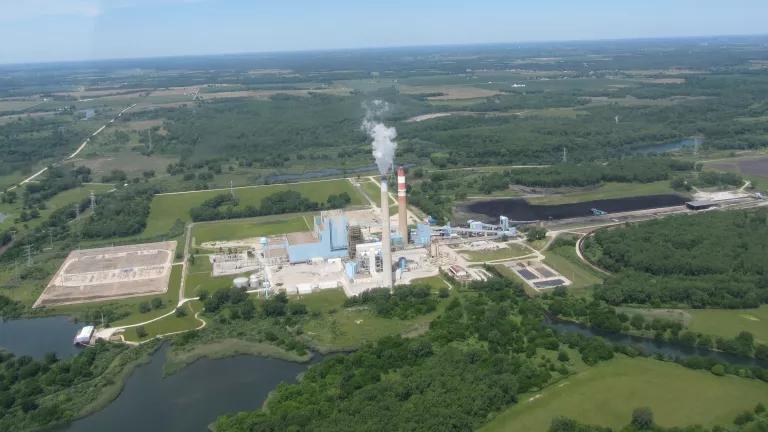Time to Bury Big Oil's Criminal Enhancement Bill for Good
An Illinois legislator is pushing for a bill which would significantly enhance criminal penalties for anyone entering or causing damage to a very widely defined group of “critical infrastructure facilities,” effectively chilling peaceful exercise of freedom of speech, and threatening to disproportionately harm people of color.

Under the "L" tracks. One of many areas where HB 1759 would enhance criminal penalties. Photo: Dave Tamburo
For the third year in a row, an Illinois legislator has introduced a so-called “critical infrastructure” bill that enhances criminal penalties for minor offenses near fossil fuel infrastructure and in many other areas.
A previous version of this bill passed the Illinois House in 2019 (I wrote about it at the time), but since then, supporters of the bill have dwindled and the list of organizations opposing it has grown longer and more diverse - more than 40 in all. This didn’t happen on its own, but because of extensive organizing, direct advocacy, and grassroots action. It's come back from the dead twice before. 2021 should be the last time this bill sees the light of day.
The following is a lightly edited version of a sign-on letter opposing HB 1759. More than 40 civil rights, labor, environmental, and community groups signed on in opposition to the bill. You can see the full sign-on letter here.
HB 1759, which would significantly enhance criminal penalties for anyone entering or causing damage to a very widely defined group of “critical infrastructure facilities.” HB 1759 is unnecessary and arbitrary, it would chill peaceful exercise of freedom of speech, and it threatens to disproportionately harm people of color.
This bill is based on model legislation from the ultra-conservative American Legislative Exchange Council (“ALEC”), which has pushed similar bills around the country. ALEC has also been a key backer of so-called “voter ID” bills designed to suppress voting by people of color, and helped proliferate the Florida “Stand Your Ground” law cited to prevent the arrest of George Zimmerman after he killed Trayvon Martin.
HB 1759 invents new crimes with excessive penalties for activities that are already covered under Illinois law. It would make any amount of property damage or any “criminal trespass” at a “critical infrastructure facility” a felony.
For example, it appears that under HB 1759, something as small as drawing on a building with a marker could result in felony charges punishable by up to 3 years in prison. Someone could face another felony charge and up to another 3 years in jail if they were alleged to have “intent to damage, destroy, or tamper with equipment of the facility,” another vague and broadly applicable definition.
Bills like HB 1759 that enhance criminal penalties near “critical infrastructure” are sometimes called “pipeline protest” bills. This is because they were first adopted in states such as North and South Dakota where indigenous activists peacefully protested oil pipelines such as Keystone XL and Dakota Access. In their original context, they are generally understood to have been created for use against those protestors. These laws have faced lawsuits, including in South Dakota and Louisiana.
But HB 1759 defines “critical infrastructure” broadly, and these enhanced criminal penalties would extend to many more people than just those protesting oil pipelines. Some of the places it defines as “critical infrastructure” include: power lines; chemical, polymer, steel, or rubber manufacturing facilities; telecommunications switching offices; cell towers, telephone poles and lines; railroad tracks; trucking terminals or other freight transportation facilities; or a “storage facility that is enclosed by a fence or other physical barrier.”
A normal person might not even be aware in some cases that they were near one of these facilities. It’s easy to imagine a group of teenagers scribbling their names near some railroad tracks, or a person who is homeless damaging a fence to sleep near a storage facility for lack of better options. Under HB 1759, they could be charged with felonies.
This bill would significantly and arbitrarily enhance criminal penalties in many locations, turning what would otherwise be low-level offenses into felonies. It violates the rule of law, which says that laws should be “equally enforced.” Under HB 1759, the exact same act that is a misdemeanor on one side of a fence would be a felony on the other side.
This bill has the potential to worsen the already excessive harshness with which our criminal justice system treats Black people and other people of color, who are disproportionately arrested for the type of low-level offenses that would have enhanced penalties under HB 1759. Black people are more than twice as likely to be arrested for vandalism and 70% more likely to be arrested for vagrancy, compared to white people1. In some places, these disparities are even more acute. For example, a report by the ACLU of New Jersey2 found that Black people in Jersey City were 7.7 times more likely than white people to be arrested for trespassing.
HB 1759 threatens to harm Black people (and other people of color) by enhancing criminal penalties on offenses for which they are already disproportionately arrested.
The right to protest or peaceful assembly is critical to a functioning democracy and at the core of the First Amendment. Many of our most fundamental freedoms were won through mass protest, as exemplified by Women’s Suffrage and the civil rights movement of the 1960s. At the time, these protests were often deeply unpopular, and opponents often found ways to criminalize them.
While supporters of this bill claim to be worried only property damage, the clear intent of HB 1759 is to instill fear in peaceful protestors, and to chill Illinoisans’ exercise of their First Amendment right to free assembly and speech.
Organizations opposing HB 1759
The DuPage County NAACP wrote their own letter opposing HB 1759. You can see the letter here.
Civil Rights organizations
- ACLU of Illinois
- Center for Protest Law and Litigation
- Chicago Food Policy Action Council
- Civil Liberties Defense Center
- Defending Rights & Dissent
Labor organizations
- Chicago Teachers’ Union
- Chicago Workers' Collaborative
- National Nurses United
- SEIU Illinois Council
- United Electrical, Radio & Machine Workers of America (UE), Western Region
- Railroad Workers United
Community, Democracy, and Faith organizations
- Common Cause Illinois
- Fox Valley Citizens for Peace & Justice
- Illinois People's Action
- ONE Northside
- The People’s Lobby
- Southern IL Democratic Socialists of America
- Unitarian Universalist Service Committee
Environmental and Environmental Justice organizations
- 350 Chicago & 350 Kishwaukee
- Center for Neighborhood Technology
- Citizens' Greener Evanston
- Clean Power Lake County
- Climate Reality Project, Chicago Chapter
- Elevate
- Environmental Law and Policy Center
- Extinction Rebellion
- Food & Water Watch
- Greenpeace
- Institute for Policy Studies Climate Policy Program
- Illinois Environmental Council
- Little Village Environmental Justice Organization
- Natural Resources Defense Council
- Openlands
- Prairie Rivers Network
- Save Our Illinois Land (SOIL)
- Sierra Club Illinois Chapter
- Southeast Environmental Task Force
- Southeast Side Coalition to Ban Petcoke
- Southern Illinoisans Against Fracturing Our Environment (SAFE)
- Union of Concerned Scientists
[1] Data from FBI report “Crime in the U.S. 2018” and U.S. Census.
[2] ACLU of New Jersey, “Selective Policing: Racially Disparate Enforcement of Low-Level Offenses in New Jersey” https://www.aclu-nj.org/files/7214/5070/6701/2015_12_21_aclunj_select_enf.pdf



